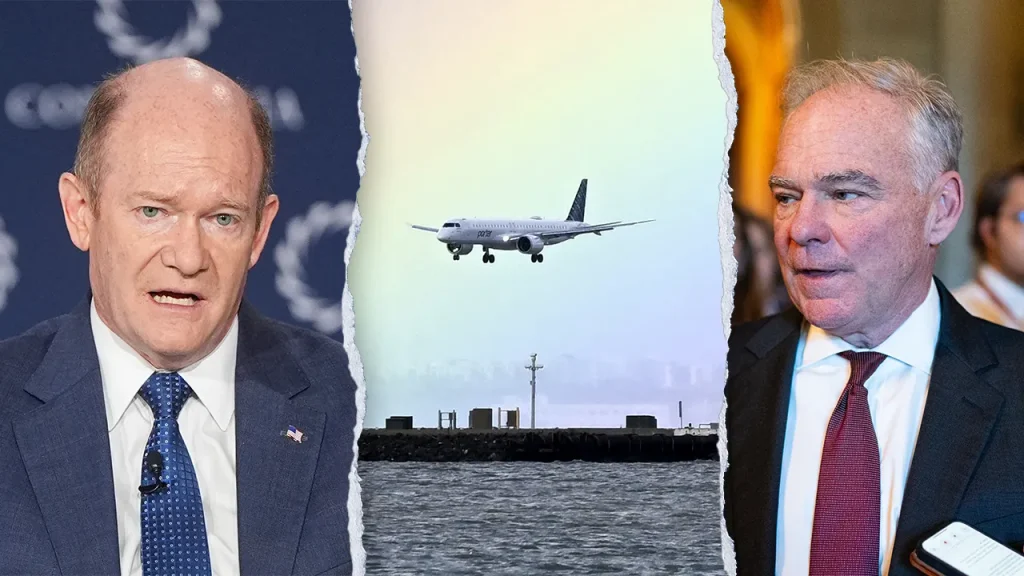Listen to the article
Democratic Senators Divided Over Transportation Secretary’s Flight Reductions Ahead of Thanksgiving
Transportation Secretary Sean Duffy’s order to reduce flight capacity by 10% at 40 U.S. airports has drawn contrasting responses from Democratic senators, revealing a split in messaging over the decision’s motivation amid the ongoing government shutdown.
The reduction, announced Wednesday ahead of the busy Thanksgiving travel period, has prompted Republicans to blame Democrats for any resulting travel disruptions. White House Press Secretary Karoline Leavitt claimed Democrats won’t vote to reopen the government unless “planes fall out of the sky,” while Senate Commerce Committee Chairman Ted Cruz called the situation “flirting with disaster.”
Democratic lawmakers offered conflicting interpretations of Duffy’s decision. Senator Tim Kaine (D-Va.) appeared to support the transportation secretary’s rationale, telling reporters on Capitol Hill, “We’ve got to make sure that flights are safe.” He added, “I don’t question Secretary Duffy. He wants to make sure that flights are safe.”
However, Senator Chris Coons (D-Del.) suggested more political motivations behind the move. “My impression is this is another attempt at putting pressure on Congress to reopen the government,” Coons told reporters. He argued that air traffic controllers and airport personnel were already facing strain before the shutdown due to cuts from President Trump’s Department of Government Efficiency (DOGE) led by Elon Musk.
Coons insisted Congress should focus on “the health care cliff that is impacting millions of Americans” rather than yielding to what he characterized as pressure tactics regarding air travel.
Representative Rick Larsen (D-Wash.) echoed these concerns, calling the flight reduction “unprecedented” and demanding greater transparency. “The FAA must immediately share any safety risk assessment and related data that this decision is predicated on with Congress,” Larsen stated. “If we want to resolve issues in the National Airspace System, let us fix health care, open government and pay air traffic controllers.”
The travel industry has expressed alarm over the potential consequences. U.S. Travel Association President and CEO Geoff Freeman acknowledged that safety must remain the top priority but warned of inevitable disruptions. “The decision to reduce scheduled flight capacity, while necessary to keep our skies safe, will inevitably affect the travel experience, leading to fewer flights, longer delays and more disruptions for travelers,” Freeman said.
Earlier this week, the association sent a letter to congressional leaders signed by hundreds of tourism and travel industry groups, warning of significant economic impacts if the shutdown continues through Thanksgiving. The letter noted that over 20 million passengers flew during Thanksgiving week last year, making it “one of the most economically important travel weeks of the year.”
Industry experts warn travelers could face higher costs, extended wait times, and increased likelihood of delays and cancellations that could derail family travel plans nationwide.
The reduction in flight capacity comes at a particularly challenging time for the aviation industry, which typically sees some of its highest passenger volumes during the November holiday period. With the 10% reduction affecting 40 major airports, travelers are being advised to prepare for potential disruptions and consider backup plans.
As the political standoff continues, the impact on American travelers—and the broader economy—remains a growing concern for both industry leaders and ordinary citizens planning holiday travel in the coming weeks.
Fact Checker
Verify the accuracy of this article using The Disinformation Commission analysis and real-time sources.




5 Comments
Reducing flights ahead of a busy holiday travel period is a tricky balancing act. The government shutdown likely adds another layer of complexity. Hopefully the transportation secretary can find a pragmatic solution that puts passenger safety first while minimizing disruptions.
This seems like a politically charged issue with both sides trying to score points. I’d be curious to hear more details on the specific safety concerns that prompted the flight reductions. Hopefully the senators can put partisanship aside and work together on a sensible resolution.
The transportation secretary is in a tough spot, having to navigate both safety and political pressures. I wonder if there are any creative ways to address the concerns without such dramatic flight cuts that could inconvenience travelers. Constructive dialogue between all parties would be ideal.
Interesting to see the divide within the Democratic party on this transportation issue. Safety should be the top priority, but political posturing seems to be clouding the discussion. I wonder if there’s more nuance to the secretary’s rationale beyond just safety concerns.
This seems like a complex situation without easy answers. I hope the transportation secretary and senators can work together to find a solution that prioritizes passenger safety while minimizing disruptions. Staying focused on the real issues at hand will be key.